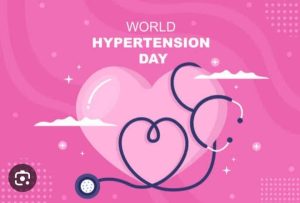By Mutalib Jibril

Also known as hypertension, high blood pressure is a common medical condition in which the force of blood pushing against the walls of the arteries becomes too high.
High blood pressure is commonly referred to as the “silent killer” due to its tendency to lack noticeable symptoms in the early stages.
However, if left untreated, it can result in significant long-term health complications such as stroke, kidney problems,heart disease,vision impairment and damage to blood vessels throughout the body.
The normal blood pressure rate for adults is around 120/180 millimeters of mercury (mmHg).
Hypertension can be classified into two: Primary (Essential ) hypertension and Secondary Hypertension.
Primary (essential) hypertension is the most common type of hypertension that develops over time with no identifiable cause while secondary hypertension is caused by an underlying medical condition.
Signs of High Blood Pressure
The majority of individuals with high blood pressure remain unaware of their condition until it is detected during a routine medical examination.
Nonetheless, there are instances where individuals with significantly high blood pressure may exhibit specific signs and symptoms. These can include: Headache, blurred vision, dizziness, nosebleeds etc.
Since the majority of individuals with this health condition are unaware until detected, world hypertension day is observed annually on 17th May to raise awareness and promote education about hypertension across the globe.
Causes of High Blood Pressure
The specific factors that contribute to high blood pressure are not exactly known, but various factors are believed to have a role in the development of high blood pressure. These are: Excess weight or obesity, stress, genetic predisposition, lack of physical activity, smoking, intake of Alcohol, excessive consumption of salt in the diet etc.
How to Prevent Hypertension
To prevent high blood pressure and maintain good health,the following strategies need to be adhered to: Quit smoking as it damages blood vessels and contributes to high blood pressure. Quitting smoking is crucial for improving overall health and lowering blood pressure.
Manage stress effectively because chronic stress can contribute to hypertension. Aslo, embrace a healthy diet low in sodium ,fats and cholesterol.
Get enough sleep. Lack of quality sleep contributes to high blood pressure .
More so, maintain a healthy weight by adopting a balanced diet and engaging in regular physical activity.
Reduce your consumption of high sodium foods like processed and packaged items, salty snacks and fast foods.
In addition, regularly check your blood pressure. Monitoring your blood pressure helps to detect any changes early and allows for timely intervention, if needed .
And above all, it’s important to consult with a healthcare professional regarding concerns about your blood pressure. They are best equipped to access your specifications and provide appropriate recommendations based on your individuals .
